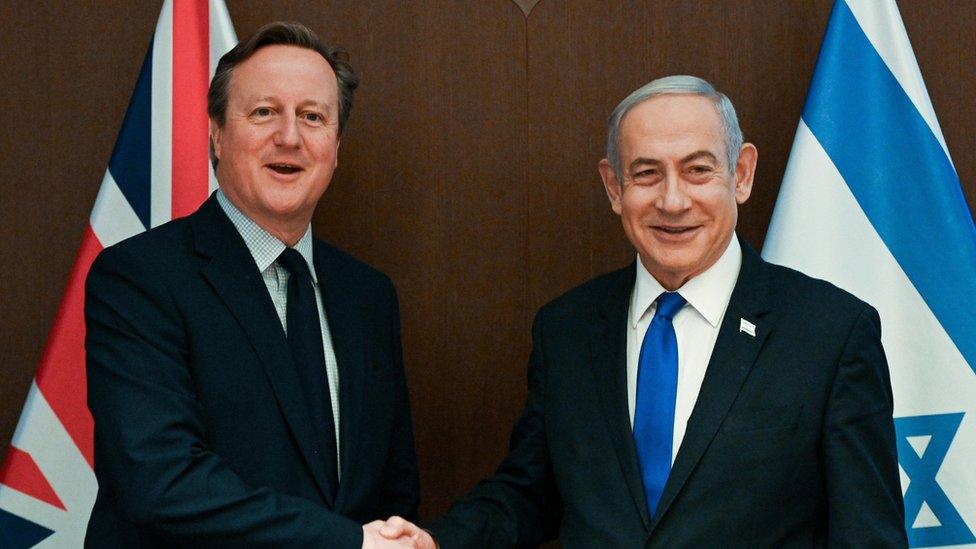UK ban on selling arms to Israel would strengthen Hamas, says Cameron
- Published
Watch: UK arms exports change would make Hamas stronger, says Cameron
A UK ban on selling arms to Israel would only strengthen Hamas, the foreign secretary has told the BBC.
Lord Cameron said while he would not support a major ground offensive in the Gazan city of Rafah, the UK would not copy US plans to stop some arms sales.
He said the UK supplies just 1% of Israel's weapons and warned Israel must do more to protect civilians and allow humanitarian aid through.
Labour's Jonathan Ashworth said he did not want UK-made arms used in Rafah.
This week US President Joe Biden upended part of one of the world's most significant strategic relationships by saying the US are "not supplying the weapons " if Israel went ahead with a planned invasion of Rafah - the southern Gazan city where about 1.4 million people have been sheltering.
The UN says more than 80,000 people have fled Rafah since Monday, with Israeli tanks reportedly massed close to built-up areas.
Israel has said it will proceed with planned operations in Rafah despite the US and other allies warning that a ground offensive could lead to mass civilian casualties and a humanitarian crisis.
Its prime minister, Benjamin Netanyahu, has pledged to eliminate Hamas battalions he claims are based in Rafah.
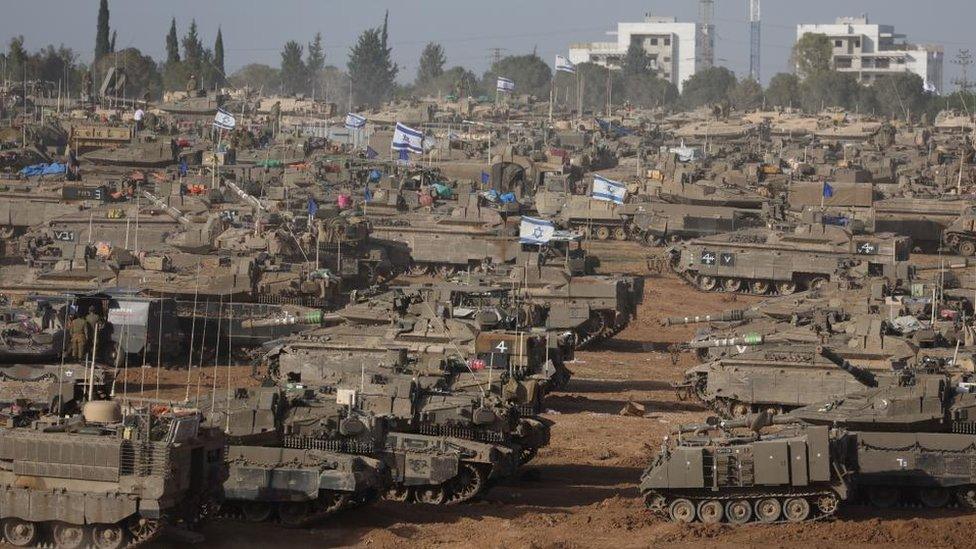
Israeli tanks and other armoured vehicles gathered near the Gaza border fence on Thursday
Speaking on Sunday with Laura Kuenssberg, Lord Cameron said he would not support a full-scale offensive on Rafah until he saw Israel's "plan to protect people".
But he argued the US, which he called "a massive state supplier of weaponry", is in "a totally different position" to the UK.
The UK government does not directly sell arms to Israel but grants licenses to weapons companies based on legal advice. In contrast, the US uses a less restrictive government-to-government deals to sell arms.
Lord Cameron said the last time he was urged to end weapons sales to Israel, when three Britons were killed in an air strike on aid workers in Gaza, "a few days later there was a brutal attack by Iran on Israel".
"Just to simply announce today that we will change our approach on arms exports, it would make Hamas stronger and it would make a hostage deal less likely," he adds.
He said he wanted instead to focus on "hammering away every day" on getting humanitarian aid into Gaza.
On Friday, the US State Department released an investigation which found Israel may have used American-supplied weapons in breach of international humanitarian law during the war in Gaza.
Pressed on whether he agreed with the findings, Lord Cameron said Israel's "performance is not good enough", arguing "Israel has not had a clean bill of health" on allowing humanitarian aid into the country.
But the UK "has a different approach" and Lord Cameron said he was "not really interested in message sending" through political moves like ending weapons sales.
Lord Cameron said: "I'm interested in what can we do to maximise the British pressure and the outcome that will help people in their lives - including getting the hostages, including British nationals, released."
He dismissed the idea of British boots on the ground in Gaza, saying it was "a risk that we should not take".
It comes after the BBC last month reported the government was considering sending British troops into Gaza to help deliver aid via a new sea route.
'Aiding war crimes'
Labour MP Zarah Sultana accused the government of not following its own rules by supplying weapons to Israel.
The government's Strategic Export Licensing Criteria, external prevents weapons sales "if there is a clear risk that the items might be used to commit or facilitate a serious violation of international humanitarian law".
Ms Sultana said the scale of arms sales to Israel "does not matter".
"We are aiding and abetting what are war crimes happening on a daily basis" she told the BBC.
Labour's position on Gaza has shifted since the 7 October Hamas attacks, in which 252 people were kidnapped and about 1,200 killed, sparked a full-blown Israeli military operation in the area.
Since then more than 35,000 people have been killed and 78,000 others wounded in Gaza, according to the territory's Hamas-run health ministry.
Last year, 10 Labour frontbenchers quit over the party's failure to call for a ceasefire in Gaza as it instead backed a "humanitarian pause" to allow aid to flood into the country.
But in February, Labour began calling for an "immediate ceasefire" after the situation in Gaza "evolved".
Mr Ashworth, a senior member of the shadow cabinet, said he did not "want to see British-made weapons used" in an invasion in Rafah.
"A full-scale offensive into Rafah will be a catastrophe beyond description," he said.
He called on the government to publish the legal advice it has been given on arms sales to Israel.
Related topics
- Published27 April 2024
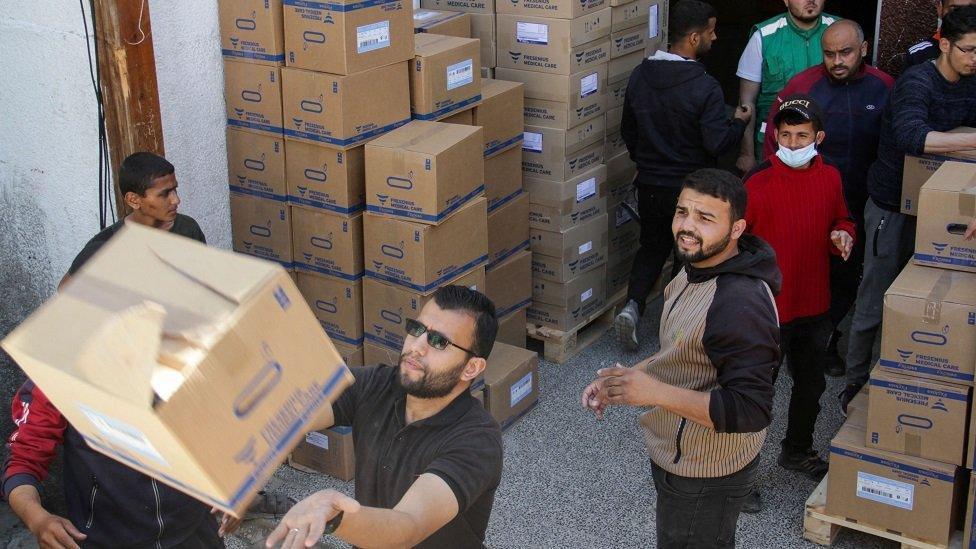
- Published9 May 2024
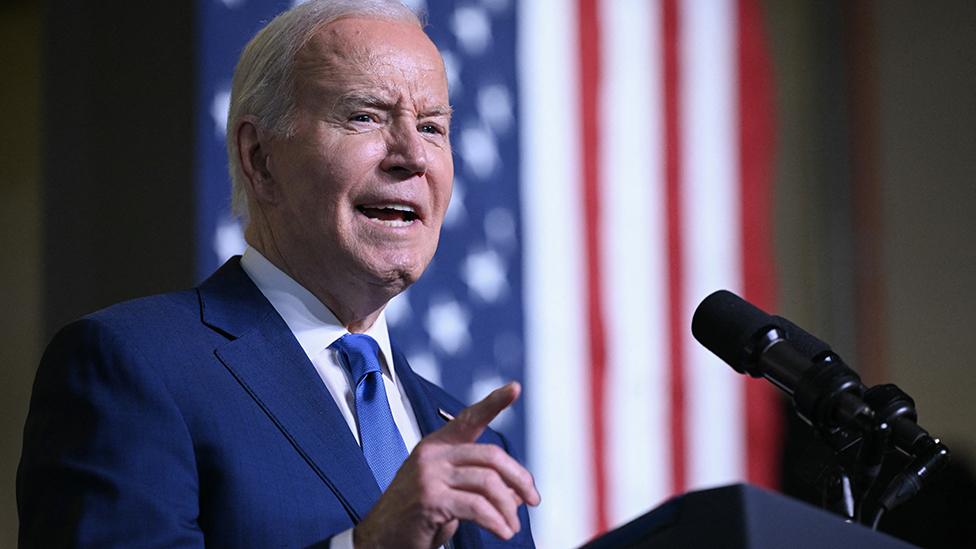
- Published3 September 2024
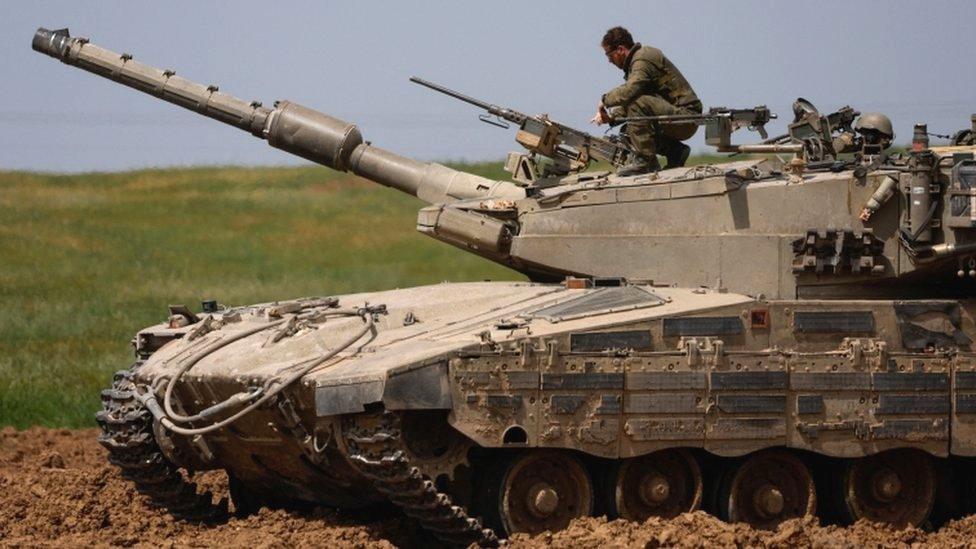
- Published17 April 2024
